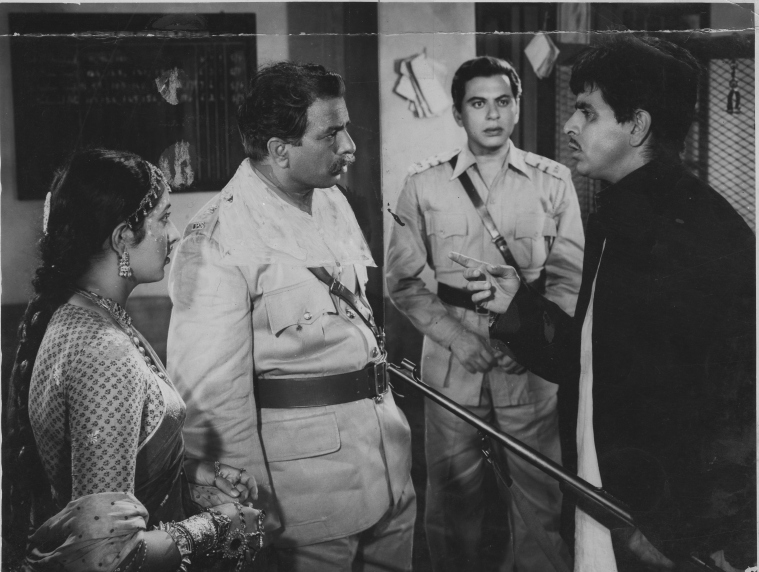Gunga Jumna had Dilip Kumar playing a man who gets turned towards the path of crime because of the unjust system that favours the rich
The term ‘angry young man’ became synonymous with Amitabh Bachchan in 1973 after his role in Zanjeer and subsequent films like Deewar, Kaala Patthar, Trishul, further solidified his image as the man who has been wronged by the system and has decided to go against law and order, just so he can survive in a dog-eat-dog world. But decades before Amitabh Bachchan made the anti-hero character a mass favourite, the character type was seen in Nitin Bose’s film Gunga Jumna. Here, Dilip Kumar played Gunga, the man who has gotten the short end of the stick and has to make some wrong choices so he can feed his family
Gunga Jumna is the story of two brothers – Gunga, played by Dilip Kumar and Jumna, played by Nasir Khan. The two have had a difficult childhood but Gunga, the older brother, has always made sure that Jumna gets the best of resources to study. They lose their mother at a young age so Gunga has assumed the responsibility of a parent here. Circumstances pull them in different directions and Gunga ends up becoming a dacoit, while Jumna becomes a police officer. If you are wondering that this sounds strikingly like Deewar, then you are not wrong. By Salim Khan’s own admission, Salim-Javed (the writers of Deewar) were inspired by Gunga Jumna and Mother India for writing Deewar. In a conversation at Whistling Woods with Subhash Ghai, Salim Khan had shared, “While writing Deewar, we were influenced by two films – Mother India and Gunga Jumna.” Javed Akhtar had also discussed the idea of the angry young man in a conversation during Jaipur Lit Fest in 2017 where he also spoke about the origins of this character existing in Gunga (from Gunga Jumna) and Birju (from Mother India).

Dilip Kumar, who had also written the film, was very well aware that the audience might find it hard to root for a morally dubious character so he had to give them enough reason to explain his decisions. “If the character was on the wrong side of the law as in Gunga Jumna, it was important for me to acquaint the viewer with the reasons for the character taking to a lawless life and make him pay the penalty for it. Gunga, therefore, has no reprieve from the law when he tries to explain that he was the victim of a trap set by the zamindar. When I wrote the story/screenplay, my brother Nasir, for whose comeback the picture was made, told me I was making a mistake. He believed people would not like to see me as a bandit and a law-breaker,” he told Filmfare in a 2013 interview.
Gunga Jumna eventually became the Bible for films of the 1970s where brothers would often end up on opposite sides of the law. The dacoit genre, which also had a huge presence in Hindi cinema in those days, also found its roots through this film. “Gunga Jumna’s achievement is the inspiration it provided to writers to give the hero a flaw or what you call a negative shade,” Dilip Kumar had said.
Gunga Jumna is a classic example of a story that pits wrong against right but does not put them in boxes of black and white. Instead, it presents a nuanced story of someone who chooses the wrong path when faced with an ethical conundrum. Gunga earns an honest living and is seemingly living a comfortable life but when he slaps the local zamindar as he is trying to rape a woman, the zamindar marks Gunga as his target. He gets framed for theft, is jailed, later boycotted by his own village. So much so that at one point, Gunga is struggling to survive because he hasn’t eaten for days. When he learns that his brother is living on the streets in the city because he had no money to support himself, Gunga breaks down and decides to join a gang of dacoits.
In a crucial scene towards the end of the film, Gunga is told by a senior police officer that he is being punished for his sins. He breaks down, and with tears in his eyes says that he is well aware of his misdemeanours, but what was he supposed to do in a society that favours the rich, and is manipulated by corruption.
Dilip Kumar’s performance in Gunga Jumna is often cited as one of the finest acts of the late actor. In fact, Amitabh Bachchan too has often said that Dilip Kumar’s performance in this film was like a lesson for him. His Awadhi dialect surprised the audience and the critics alike, all over the world. In a 2013 interview with Filmfare, Dilip Kumar had shared that when Gunga Jumna was screened at Karlovy Vary, Czechoslovakia, Boston and Cairo, he was “besieged by film critics who were intrigued by my acting and were curious to know how much research had gone into it.”
When Gunga Jumna released, Hindi cinema championed traditional heroes, who were plain do-gooders and often chose the morally upright path when faced with a dilemma. Gunga Jumna changed that, and that change sparked a revolution in our understanding of what a hero could be. Of course, the definition of a hero has changed in the years since, but Gunga Jumna is one of the early examples that challenged the stereotype.





































